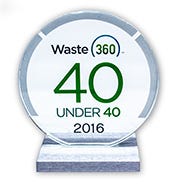The Recycling Partnership's Harrison has Transformed the Infrastructure of Curbside Recycling
She has helped The Recycling Partnership generate more than $20 million in new recycling infrastructure investment across the U.S.
Keefe Harrison is the lead developer and current executive director of The Recycling Partnership, a national nonprofit transforming recycling in towns across America.
Over the past 13 years, Harrison has used her passion and determination to ramp up the nonprofit into a solid foundation. Since 2015, she helped The Recycling Partnership generate more than $20 million in new recycling infrastructure investment across the U.S, directly impacting recycling for nearly 2 million households in more than 100 cities.
“Keefe has been an industry leader for many years; however, I believe her most notable achievement has been her dogged determination to develop The Recycling Partnership, a first of its kind public-private partnership to transform curbside recycling infrastructure,” says The Recycling Partnership Project Director Karen Bandhauer. “Since that time, the work and impact has only grown. In 2016, it is fair to say that under Keefe's leadership The Recycling Partnership is filling a void in the industry and generating real tangible results for both our members and our city partners.”
Harrison, a Waste360 40 Under 40 award recipient, talks with Waste360 about how she got her start in the industry and how she has helped generate $20 million in new recycling infrastructure investment across the U.S. over the past two and a half years.

Waste360: How did you get your start in the waste and recycling industry?
Keefe Harrison: I’ve always wanted to work for positive change in the world. In college, I started off pursuing herpetology with the intent of being a field biologist (tagging sea turtles in Costa Rica). I smattered in a semester pursuing forestry and serving on a logging team (yes, I ran a chainsaw and drove Big Mamma, the cancerous old logging truck) and a semester at the University of Oulu in Finland focusing on Scandinavian environmental studies, but that all changed because of my then college boyfriend, now husband’s, $7/hour can man job. Picking up aluminum cans for the UNC Greensboro campus recycling program was one of his college side jobs, and it opened up the beguilingly difficult world of recycling for me. Quickly hooked after landing a part-time job as an environmental educator for that same campus program, I switched to a self-designed major designed to prepare me to work in this field of public and private sectors, business and environment. And I’ve been here ever since.
That first job in college had everything from building newsletters to hauling loads in box trucks to finding new solutions for an ever-growing list of recyclable items. Over the years, it progressed to running the program and expanding into campus sustainability. Finally, I made the shift to work for several years with the North Carolina Department of Environment with an important focus on technical assistance for local governments – a foundation of the work I still do today. From there, I spent many years working on projects with The Southeast Recycling Development Council, Booz Allen for EPA, Association of Plastics Recyclers and RRS, where, with EPA funding, we built and launched the program that is now known as The Recycling Partnership.
Waste360: How did you help lead The Recycling Partnership to generate nearly $20 million in new recycling infrastructure investment across the U.S.?

Keefe Harrison: Together with our industry and brand partners, we developed a scalable model that focused on two essential needs of the recycling system: increasing recycling access and reducing contamination. The model has proved powerful and the human element of that is key – our top-notch staff delivers free technical assistance along with effective communications tools to build strong programs at the community-to-MRF level.
Recycling is more than a sum of our carts. Our approach is intimate, and it takes passionate, hard work. But with each new dollar that comes in, we reach out to another community to offer resources and engage the models there as well. It honestly takes the brains and the efforts of each individual staff member to implement these models, but we all work hard and love the work that we do.
Waste360: What is The Recycling Partnership currently working on?
Keefe Harrison: We are working hard to make sure that our operations and educations are properly married in all of our work. People are always looking for resources to make programs run better, smoother, easier, faster, etc., and what we produce is exactly that. We haven’t yet made a fully concentrated effort to merge our operations and educations, but that’s where some of our magic is and we need to make sure that those are tightly woven together.
But beyond our community-focused efforts, there’s good work on measurement coming from our Technical Council, MRF acceptability standards coming from our MRF working group and peer-to-peer problem solving with our State Leaders Group.
Waste360: Tell us about the proudest moment in your career thus far.
Keefe Harrison: That moment is today! Each day, I’m grateful to be surrounded by the Partnership staff who, along with our advisory councils, represent some of the smartest, hardest working people in our field. More people are coming to the table with ideas on how to make things better, and that is the biggest compliment I could ever receive. It takes a team to deliver tons!
Waste360: What would you like to tell the next generation about the waste and recycling industry?
Keefe Harrison: Recycling seems so simple: You put the materials in a bin, and they go away. But, in reality, it’s very difficult and there are so many different companies, communities, public sectors and private sectors that are all merged together in the industry of waste and recycling. This industry is a loosely connected, highly dependent network that is riddled with inefficiencies so the work that we do around collaborations and connecting one dot to another dot truly takes teamwork, a good dose of personality and the willingness to dig in. Patiently building action-focused collaborations is the only way to move forward.
The thing that continues to excite me about our industry is the view that recycling exists not to save landfills but instead to fuel manufacturing. It’s the economic model that builds the legs and longevity of this industry and the bonus factor is that each step along that economic change also has an environmental impact. The economic pull drives positive environmental outputs. Beautiful!
About the Author
You May Also Like




